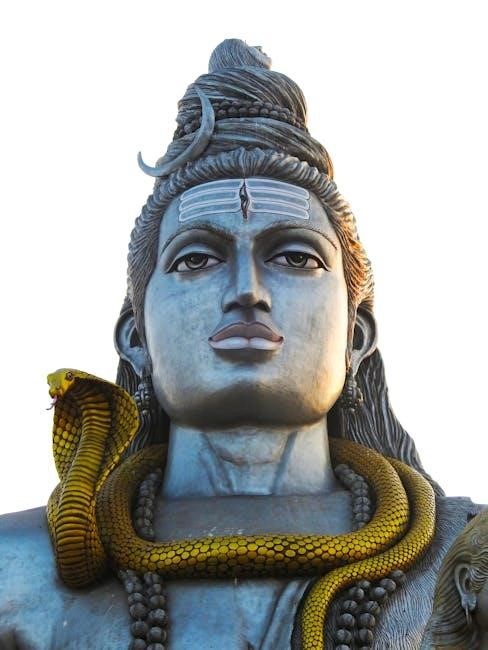In “God Is Not One,” Stephen Prothero challenges the belief in a single religious truth, exploring how diverse faiths shape global understanding and cultural identities.
Overview of the Book and Its Author
“God Is Not One” is a thought-provoking book by Stephen Prothero, a renowned scholar of religious studies. Published in 2010, the book challenges the idea of a single, universal religious truth. Prothero, known for his insightful analyses, explores eight major religions, highlighting their unique beliefs and practices. The book emphasizes how these differences shape global interactions and cultural identities; By examining Christianity, Islam, Buddhism, Hinduism, and others, Prothero argues that understanding these distinctions is crucial for fostering dialogue in an increasingly interconnected world. His work has been praised for its clarity and depth, making it a valuable resource for interfaith discussions and religious studies.
Central Theme: The Diversity of Religious Beliefs
The central theme of “God Is Not One” revolves around the diversity of religious beliefs and the unique doctrines of major world religions. Stephen Prothero argues that each religion offers distinct answers to life’s fundamental questions, such as the nature of God, humanity’s purpose, and the path to salvation. By comparing religions like Christianity, Islam, Buddhism, and Hinduism, he illustrates how these differences shape cultural identities and global interactions. Prothero emphasizes that understanding these variations is essential for fostering mutual respect and effective dialogue in a pluralistic world. His approach challenges the notion of religious uniformity, promoting instead an appreciation for the richness of diverse faith traditions.

The Core Concept of “God Is Not One”
The book’s core concept explores the diversity of religious beliefs, arguing against the idea of a single universal truth. Prothero examines eight major religions.

Exploring the Idea of Multiple Gods Across Religions
Stephen Prothero delves into the concept of multiple deities within various religious frameworks, highlighting how different faiths perceive and worship distinct divine entities. This exploration reveals that while some religions, like Hinduism, embrace a multitude of gods, others, such as Christianity and Islam, adhere to monotheism. Prothero argues that understanding these differences is crucial for fostering interfaith dialogue and cooperation in an increasingly interconnected world. By examining these diverse beliefs, the book emphasizes the importance of respecting religious pluralism and recognizing the unique theological perspectives each tradition offers.
Why Religious Differences Matter in a Globalized World

Stephen Prothero underscores the significance of understanding religious differences in a globalized world, where diverse faiths increasingly intersect. Ignoring these distinctions can lead to misunderstandings, conflicts, and failed attempts at cooperation. By acknowledging the unique beliefs and practices of each religion, individuals and societies can foster mutual respect and dialogue. Prothero argues that recognizing religious diversity is not about minimizing differences but about embracing them to build bridges across cultures. In a world where religions shape identities and inform values, understanding these differences becomes essential for peaceful coexistence and addressing global challenges together.

Key Religions Discussed in the Book
The book examines Christianity, Islam, Buddhism, Hinduism, and other major religions, highlighting their distinct beliefs and practices to illustrate the diversity of global faith traditions.
Christianity: The Concept of One God
Christianity is rooted in the belief in one omnipotent God, expressed through the Trinity—Father, Son, and Holy Spirit. This monotheistic foundation contrasts with polytheistic religions, emphasizing unity and divine sovereignty. The Bible, particularly verses like James 1:5, underscores God’s generosity and wisdom, encouraging believers to seek guidance without doubt. Christianity’s focus on a single deity shapes its moral framework and interfaith dialogue, highlighting both commonalities and differences with other religions. This concept is central to Christian identity, influencing cultural and ethical perspectives globally.
Islam: The Unity of God (Tawhid)
In Islam, Tawhid, or the oneness of God, is the central doctrine, emphasizing Allah’s uniqueness and indivisibility. This concept rejects polytheism and attributes, affirming Allah as the sole creator and sustainer. The Shahada, the Islamic declaration of faith, underscores Tawhid: “There is no god but Allah.” This belief shapes Islamic thought, ethics, and daily life, guiding followers to submit entirely to Allah’s will. The Quran repeatedly stresses divine unity, as in Surah 112, which states, “Say, He is Allah, the One and Only.” Tawhid’s profound impact on Islamic identity and practices highlights its role in fostering a devoted and unified global community.
Buddhism: The Rejection of a Creator God
Buddhism stands apart by rejecting the concept of a creator god, focusing instead on the Four Noble Truths and the path to enlightenment. The absence of a divine deity emphasizes human agency and moral responsibility. The teachings of Siddhartha Gautama highlight suffering as inherent to life, urging individuals to seek liberation through the Eightfold Path. This rejection of a creator god underscores Buddhism’s unique philosophical framework, which centers on self-realization and the law of karma rather than divine intervention. Prothero’s analysis in “God Is Not One” highlights how Buddhism’s non-theistic approach contrasts sharply with monotheistic traditions, offering a distinct perspective on existence and liberation.
Hinduism: The Multiplicity of Gods
Hinduism is characterized by its vast array of deities, each embodying distinct attributes and roles. The pantheon includes millions of gods and goddesses, reflecting the diverse aspects of human experience and the cosmos. Central figures like Brahma, Vishnu, and Shiva form the Trimurti, symbolizing creation, preservation, and destruction. This multiplicity underscores Hinduism’s pluralistic nature, allowing followers to worship various deities based on personal devotion and cultural context. Despite the many gods, Hindu philosophy often unites them under the concept of Brahman, the ultimate, indivisible reality. This blend of polytheistic practices and monistic ideals highlights Hinduism’s complexity and its unique approach to understanding the divine.

Implications of Religious Differences
Religious differences shape global interactions, fostering tolerance or conflict. Understanding these distinctions is crucial in a interconnected world, promoting mutual respect and addressing misunderstandings effectively always.

How Distinct Beliefs Shape Interfaith Dialogue
Diverse religious beliefs create both challenges and opportunities in interfaith dialogue. Differences in doctrines often lead to misunderstandings, but they also encourage deeper engagement. By exploring these distinctions, participants can foster mutual respect and understanding. Open dialogue helps bridge gaps, promoting peaceful coexistence and enriching cultural exchange. It is through these conversations that empathy and tolerance grow, fostering a global community that values diversity. Interfaith dialogue becomes a powerful tool for addressing conflicts and building harmony in a world where religious identities play a significant role. This exchange not only respects differences but also seeks common ground, enriching societies and fostering unity.
The Role of Religion in Shaping Cultural Identities
Religion plays a profound role in shaping cultural identities by influencing traditions, values, and community cohesion. It serves as a moral and spiritual guide, defining how people understand themselves and their place in the world. Religious practices, rituals, and beliefs often become integral to a culture’s art, literature, and social norms. For instance, Christianity’s emphasis on compassion and Islam’s focus on unity shape distinct cultural expressions. Similarly, Buddhism’s philosophy of interconnectedness and Hinduism’s diverse deities reflect unique cultural identities. These religious influences foster a shared sense of belonging and purpose, making them central to the fabric of cultural life worldwide.
Emphasizes understanding religious diversity to foster mutual respect and peaceful coexistence in a globalized world, highlighting the importance of recognizing and valuing different faiths.
Summarizing the Main Arguments
Stephen Prothero’s God Is Not One argues that religions are not interchangeable paths to the same truth but distinct systems with unique doctrines, rituals, and histories. He challenges the idea of a single, universal deity, emphasizing the diversity of beliefs across faiths like Christianity, Islam, Buddhism, and Hinduism. Prothero asserts that religious differences matter in shaping identities and conflicts, urging greater understanding of these distinctions to foster dialogue and cooperation. By examining the core tenets of each religion, he highlights the importance of acknowledging their unique contributions and the potential for mutual respect in a globalized world.
The Importance of Understanding Religious Diversity
Understanding religious diversity is crucial for fostering global harmony and addressing societal conflicts rooted in misinterpretation. By recognizing the unique beliefs, practices, and histories of religions, individuals can move beyond superficial tolerance to meaningful dialogue. Misunderstanding religious differences often leads to division, but informed empathy bridges these gaps. Prothero’s work underscores the necessity of education in dismantling stereotypes and promoting cross-cultural respect. In a world where religion deeply shapes identities and conflicts, comprehension of diverse faiths becomes a tool for peace and cooperation, enabling societies to navigate differences constructively and work toward shared goals. This understanding is not just intellectual but essential for global unity.
